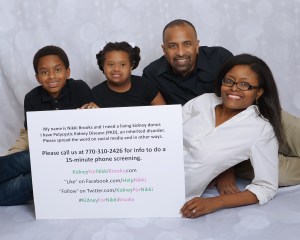 Since beginning this search, I have communicated with some really lovely people and some have told me about their experiences as a living kidney donor for either a loved one or a complete stranger. Since 1954, when the first living donor transplant took place, living donors have been making the ultimate gift around the world.
Since beginning this search, I have communicated with some really lovely people and some have told me about their experiences as a living kidney donor for either a loved one or a complete stranger. Since 1954, when the first living donor transplant took place, living donors have been making the ultimate gift around the world.
For people in kidney failure, a kidney transplant can extend and improve their lives. Both transplants from living and deceased donors extend lives but living donations have some additional benefits:
- Living donor kidneys last longer
- The kidney from a living donor may function better and sooner; kidneys from a deceased donor can take a while to start working
- The surgery can be scheduled at a convenient time for both the donor and the recipient (and all medical costs are covered by the recipient’s health care coverage)
- Donating a kidney can free up a kidney from a deceased donor for another person
While it is a big decision to donate a kidney, living donors can save lives. If you think it might be something that you are interested in, you can help by calling us at 770-310-2426 for info to do a 15-minute phone screening on being a living donor. You can also call the St. Luke’s Transplant Department directly to do the screening at 832-355-4100. Just tell them your planned recipient is Dominique (Nikki) Brooks. Even if you are not a match to me, it may be possible to work out a swap with another recipient.
A living donor candidate is a person who is healthy, well-informed and makes a voluntary decision to donate one of their kidneys. Living donors must be over 18 and in good general health, have a Body Mass Index (BMI) of less than 30, a non-smoker, with no evidence of significant high blood pressure, diabetes, cancer, kidney disease, heart disease or hepatitis.
Thanks for helping us find a living kidney donor. Please spread the word and/or call us at 770-310-2426 for info to do a 15-minute phone screening or St. Luke’s Transplant Department directly at 832-355-4100 for me, Dominique Brooks.
Be Inspired — Give Life!
Dominique (Nikki) Brooks

 The response and support from my friends and family and from people that I don’t even know has been heart-warming. But I have learned that while many people want to help, they really are unfamiliar with the process of donating a kidney. There are three types of living kidney donations: direct donation, paired exchange, and a Good Samaritan donation.
The response and support from my friends and family and from people that I don’t even know has been heart-warming. But I have learned that while many people want to help, they really are unfamiliar with the process of donating a kidney. There are three types of living kidney donations: direct donation, paired exchange, and a Good Samaritan donation. As someone in need of a living kidney donor due to the genetic condition of Polycystic Kidney Disease (PKD), I am so grateful that people are beginning to call to do the 15-minute phone screening. Many people have reached out to me with words of support and encouragement. I also deeply appreciate the people that are spreading the word on social media and in other ways.
As someone in need of a living kidney donor due to the genetic condition of Polycystic Kidney Disease (PKD), I am so grateful that people are beginning to call to do the 15-minute phone screening. Many people have reached out to me with words of support and encouragement. I also deeply appreciate the people that are spreading the word on social media and in other ways. My name is Nikki Brooks and I need a living kidney donor. I have Polycystic Kidney Disease (PKD) which is an inherited disorder.
My name is Nikki Brooks and I need a living kidney donor. I have Polycystic Kidney Disease (PKD) which is an inherited disorder.